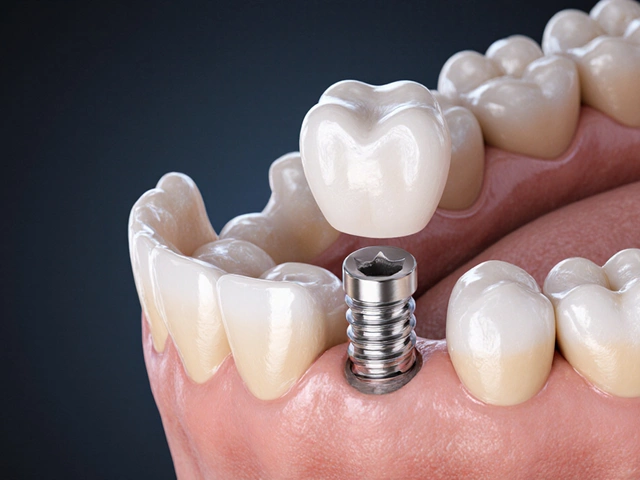When considering tooth replacement options, dental implants often come up as a frontrunner, praised for their durability and natural appearance. But, are they really worth the investment?
Before deciding, it's important to understand more about what makes dental implants unique, their costs, and the long-term benefits they offer. For many, these implants aren't just about restoring a smile but are also about improving daily life and oral health.
- Understanding Dental Implants
- Cost vs. Value
- Benefits Beyond Aesthetics
- Comparing Alternatives
- Making the Right Choice
Understanding Dental Implants
Dental implants have revolutionized tooth replacement solutions over the last few decades, offering an incredibly reliable and aesthetic option for missing teeth. At their core, these implants consist of three key components: a titanium implant screw, an abutment, and a prosthetic tooth or crown. The titanium screw acts as a stable root, embedded securely into the jawbone, offering unparalleled support and making dental implants the closest imitation to natural teeth that modern dentistry has achieved. This setup not only ensures stability, but it also prevents bone loss—a common issue with traditional dentures and bridges. Contrary to popular belief, the success of dental implants isn't solely due to the materials used but also the biological process known as osseointegration. This is where the titanium screw integrates with the jawbone tissue, creating a permanent anchor for the abutment and prosthetic crown. In fact, evidence shows that the rate of successful osseointegration in healthy individuals is remarkably high, often exceeding 95%.
Importantly, not everyone is a candidate for dental implants. A thorough oral examination, including detailed imaging, determines the suitability of this solution for each patient. Factors such as overall health, bone density, and gum condition play crucial roles in the decision-making process. It's no wonder why more than three million people in the United States have chosen this path, with half a million more opting in each year. These numbers are not just statistics—they reflect a growing trust in the procedure’s efficacy and durability. The success stories often hail from individuals who have reclaimed their confidence and dietary freedom post-implant. As Dr. John Smith, a prominent oral surgeon, once remarked, "Dental implants offer more than just a beautiful smile; they offer a piece of normalcy people miss without even realizing it."
While considering dental implants, it's essential to recognize their maintenance requirements. Like natural teeth, implants need regular cleaning and professional check-ups to ensure their longevity. The focus is not just about placing the implant, but on maintaining oral hygiene to prevent peri-implantitis—an inflammatory condition similar to gum disease, which can affect the tissues around the implant. This maintains the integrity of both the implant and the jawbone it inhabits. Patients often find solace in the idea that once the implant is placed, the maintenance doesn't exceed typical dental care routines of brushing twice a day and flossing regularly. A notable aspect many appreciate is the absence of dietary restrictions following the initial healing phase, allowing them to enjoy their favorite foods without worry.
Cost vs. Value
The first question many people ask when considering dental implants is about the cost. It's no secret that this tooth replacement solution is often more expensive than alternatives like dentures or bridges. The costs can range from $3,000 to $5,000 per tooth, depending on various factors like the complexity of the procedure and geographic location. However, there's more to think about than just the initial price tag. Dental care is an investment, and implants are no different. What makes implants appealing is their longevity. Unlike tradition dental options that may require replacement every 5 to 10 years, dental implants can last a lifetime with proper care. This can actually make them more cost-effective over the long term.
When weighing the cost, consider the improvement to quality of life. Dental implants don't just fill the gap in your smile; they play a crucial role in maintaining oral health. They help preserve jawbone structure and prevent the shifting of surrounding teeth, factors that contribute to oral problems down the line. Thus, for many, the question isn't just about cost but about value. What price do you put on your peace of mind, knowing you've made a choice that benefits your long-term health? It's also important to think about how insurance can influence your decision. While some plans may not fully cover implants, they sometimes offer partial coverage. Make sure to check with your insurance provider to understand what's included in your plan.
As Dr. John Doe, a renowned oral surgeon, puts it, "Investing in dental implants is investing in the future of your oral health. They offer unparalleled benefits for those looking for a durable, reliable, and aesthetically pleasing solution to tooth loss."
Finally, for those considering implants, understanding potential financing options is key. Many dental offices provide payment plans to make this option more accessible. Remember, it's not just the upfront costs that matter, but how the continuous benefits of implants can outweigh the expenses over time, both financially and emotionally. People often find the peace of mind they gain from a permanent solution is worth the added expense. From no more worrying about slippage to enjoying all foods with confidence, the choice of dental implants is about weighing lifetime benefits against short-term costs.

Benefits Beyond Aesthetics
When people hear about dental implants, their minds often jump straight to the visual transformation. Indeed, having a complete set of teeth can bolster confidence and improve social interactions. Yet, the advantages of dental implants transcend mere appearances. Chief among these is the improvement in oral function. With implants, people experience enhanced chewing efficiency, crucial for digesting food properly and maintaining a balanced diet, which contributes significantly to overall health and wellness. Those who've experienced tooth loss often encounter difficulties in eating their favorite meals, which can be both frustrating and detrimental to nutritional intake.
Unlike dentures, which may slip or require special adhesives, dental implants offer a stabilizing solution that integrates with the jawbone naturally. This mimics the performance of natural teeth and helps prevent the bone loss associated with missing teeth. According to Dr. Linda Wells, a renowned oral surgeon,
"Dental implants are the closest thing we have to natural teeth, clinically speaking. They not only restore aesthetics but preserve the underlying bone structure, which is vital for oral health."Such integration sets implants apart, as other options simply sit atop the gums and fail to address underlying degradation. Without the stimulation from a natural tooth or an implant, the jawbone in that area starts to resorb, leading to a host of potential issues.
In terms of durability and longevity, dental implants stand out. While other tooth replacement options might need regular replacement or refitting, well-maintained implants can last a lifetime. This makes them a financially attractive choice in the long run, despite the higher initial cost. The integral role of dental implants in speech improvement is another critical benefit often overlooked. Missing teeth or unsecured dentures can lead to speech difficulties. Implants, by offering firm support, ensure clearer pronunciation and enhance communication, making daily interactions and public speaking far less daunting.
Moreover, dental implants can positively impact mental health. Many individuals experience feelings of self-consciousness or anxiety with removable dentures, especially in social situations. Implants eliminate these concerns by providing a stable, permanent solution. This stability can significantly boost one’s confidence and reduce social fears, contributing positively to emotional well-being. Regularly interacting with the community without worrying about dental mishaps is profoundly liberating.
We're living in an age where technology continues to evolve, and dental implants have benefitted from these advancements. The materials used today are cutting-edge, including biocompatible metals like titanium, known for their strength and integration capabilities.
Statistics Highlighting Implant Success
In fact, studies show that dental implants boast an impressive success rate of up to 98%, showcasing them as a reliable option for tooth replacement. Here's a quick view on implant durability:| Type | Average Lifespan |
|---|---|
| Dental Implants | 25+ years |
| Removable Dentures | 5-7 years |
Interestingly, the process of getting implants can also instill a sense of resilience. There are aspects of life where challenges exist, and it's about finding the best way to navigate through them. For a surprisingly large number of people, investing in dental implants represents more than a physical improvement; it’s a powerful step toward reclaiming control and renewed optimism in daily life.
Comparing Alternatives
When it comes to replacing missing teeth, dental implants are just one of several options available. Each choice offers its own set of advantages and disadvantages, so knowing what's out there can help you make a more informed decision. One popular alternative is dentures. These are removable appliances that can replace either a few teeth or a whole set. While dentures might be less expensive initially than implants, they require more maintenance and can become uncomfortable over time as the shape of your mouth changes.
Another option is dental bridges. Unlike dental implants, which are anchored into the jawbone, bridges rely on adjacent teeth for support. This means that the teeth next to the missing one must be prepared and sometimes even ground down to fit the bridge properly. Although bridges can effectively restore function and appearance, they may not last as long as implants and could contribute to the wear and tear on the supporting teeth over time.
There has been a noticeable shift towards dental care solutions that offer greater longevity and stability. This is one reason why more individuals are opting for implants over traditional dentures and bridges. According to statistics from the American Association of Oral and Maxillofacial Surgeons, dental implants have a success rate of over 95% when performed by an experienced surgeon, which is significantly higher than that of bridges and dentures.
The American Dental Association has pointed out that "the choice between options should be guided by both clinical and personal preferences, and consulting a dental professional is crucial."
It's also essential to consider the psychological and lifestyle impacts. While dentures may require constant adjustments and affect your ability to taste food or speak clearly, dental implants function just like real teeth. For many, this means enjoying their favorite foods without restriction and speaking with confidence, which may justify the higher initial investment. On the flip side, for those who prefer a quicker solution or have medical conditions that make surgery riskier, opting for a bridge or partial dentures could be more practical. Weighing these factors carefully can lead to a choice that feels right both practically and emotionally.
A Closer Look at Costs
Cost comparison is naturally a significant factor when exploring alternatives. Implants might seem more expensive than bridges or dentures at first, but consider the long-term value. While dentures and some bridges often need replacement every 5 to 10 years due to wear or changes in mouth shape, a well-maintained implant can realistically last a lifetime. Here's a simple breakdown:
| Option | Initial Cost | Maintenance Cost |
|---|---|---|
| Dentures | $$ | $$ |
| Bridges | $$$ | $$$ |
| Dental Implants | $$$$ | $ |
These costs vary significantly based on factors like the complexity of the procedure and geographical location. Discussing all of these options with a trusted dental professional can help clarify what's best for your specific needs and financial situation. The choice isn’t just about financial costs but also about the benefits to your oral health and quality of life.

Making the Right Choice
Navigating the many options for tooth replacement can be quite overwhelming. For individuals considering dental implants, there are a few essential factors to consider to ensure it is the right choice. First, dental health plays a crucial role. Healthy gums and a solid bone structure provide an ideal foundation for implants. An implant, in essence, mimics the root of a tooth, anchoring firmly within the jawbone to provide lasting support and stability, much like natural teeth. If bone structure is compromised, additional procedures like bone grafting might be necessary, adding both to the timeline and the cost.
Another aspect to evaluate is long-term value versus initial costs. While implants often come with a higher price tag upfront compared to dentures or bridges, their durability can lead to cost savings over a lifetime. They're designed to be a permanent solution, reducing the need for replacements or adjustments. A well-installed implant can last upwards of twenty years or more when properly cared for, making it a sound long-term investment for oral health. Initial costs can vary significantly based on the location, the dentist's expertise, and additional procedures required, such as extractions or bone augmentations.
Consider lifestyle and comfort as well; implants feel and function much like natural teeth. They eliminate the inconveniences often associated with dentures, such as slipping and the need for adhesives. Enjoyments like indulging in your favorite foods without hesitation become possible. For many, this aspect alone brings a considerable quality of life improvement. Assessing whether this enhancement justifies the financial commitment is another key point in making an informed decision.
Another contributing factor is the psychological and aesthetic impact. A restored smile can boost confidence and social interactions significantly. For many, the ability to smile without reservation impacts not only personal satisfaction but professional presence as well. According to Dr. Simons, a well-regarded dentist with over two decades of experience,
"The confidence that stems from a healthy, radiant smile can change lives. Patients often experience an uplift in morale and self-worth post-implant treatment."
Discuss all your options with a dental professional to get personalized advice. They are equipped to assess your unique oral health status, discuss your individual concerns, and recommend the best course of action. Remember, while recommendations are valuable, the decision ultimately rests with you. It's crucial to weigh the cost vs. value, your personal preferences, and your long-term oral health goals when deciding if dental implants are worth the investment.






